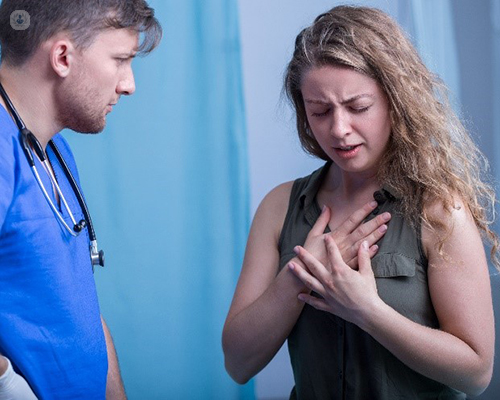Are heart palpitations dangerous?
Written in association with:If you’ve ever experienced your heart suddenly racing or skipping beats, you’ll know that it can be a frightening experience! Even though heart palpitations are usually harmless, can they ever be dangerous or a sign of something seriously wrong with the heart? Cardiologist, Dr Michael John Van der Watt, is here to explain.

What exactly are heart palpitations?
When you suddenly become aware of your own heartbeat, either because it is beating too fast or too hard, skipping a beat, or fluttering for a few seconds, then you are very likely experiencing heart palpitations. These can typically be felt in the chest, but sometimes, people experience the sensation in their throat or neck.
The most common type of palpitations are known as ectopic beats, where a person feels the sensation of an extra or missed heartbeat. This is because the heart suddenly beats too early or the rhythm is slightly delayed. Usually, these types of palpitations aren’t a cause for concern and go away on their own, but they can be bothersome or frightening when they suddenly occur.
Rarely, heart palpitations can be an indication of more serious conditions, such as atrial fibrillation in which the heart beats erratically. Although this is much more common in older patients, younger people can get it too. Even less frequently, palpitations can be associated with re-entry tachycardia; a condition in which your heart beats rapidly, more than 150 times per minute.
What causes them?
There is a wide variety of causes, and it is not unusual we don’t find the exact cause. We do know that the following can bring on heart palpitations or indeed make symptoms worse:
- Stress and anxiety
- Depression
- Caffeine
- Alcohol
- Nicotine
- Certain medications
- Hormone changes related to menstruation, pregnancy or menopause
Sometimes a patient complains they are getting palpitations, but, in fact, we discover that they have a normal heartbeat, and they merely have increased awareness of their heart beating. Throughout the day, we are not usually conscious of our own heart beating but stress and/or anxiety can make us much more aware of it.
In patients who have known structural problems in the heart or have a scar from a previous heart attack, can be more likely to suffer heart palpitations. Palpitations can be a sign of an abnormal heart rhythm (arrhythmia) which can cause your heart to beat very fast, slowly or irregularly.
How long do they last?
Ectopic beats are usually momentary skips and jumps, and the heart settles back to normal after a few seconds. If in the case of atrial fibrillation, however, the patient can experience palpitations lasting from seconds to being constant.
When a patient is suffering re-entry tachycardia, they can last from minutes to hours and people usually end up seeking medical help by going to their GP, or even the A&E, because they feel so unwell. Symptoms of this include a racing, uncomfortable heartbeat, and can be associated with chest pain, dizziness, fainting and shortness of breath.
As a general rule to remember, the longer the palpitations, the more significant they are, so this should prompt you to seek medical help.
Are they ever a sign of something more serious?
Yes. Although ectopic beats are very common and usually not associated with anything serious, there are times when they can be. If you have a history of heart disease and your palpitations occur frequently or worsen, then it might be a sign that something is wrong. Occasionally, they indicate that you’re suffering underlying health problems, such as narrowed arteries or they can be associated with more significant arrhythmias, such as atrial fibrillation which, if not treated, which increases the risk of a stroke.
Exercise should normally suppress palpitations, but if exercise causes them or makes them worse, this is a “red flag” to cardiologists as it may indicate a serious underlying heart problem that we need to address.
When should you see your doctor?
Palpitations that last more than seconds, should generally be investigated by a doctor. If you already have health problems and you’re getting them more frequently, then it might indicate that your health problem is getting worse. Keep in mind that as you get older, palpitations do become more common, but if you have any doubts or concerns about your heart, you should always visit a doctor to get it checked out.
You should seek emergency medical help if your heart palpitations are ever accompanied by:
- Severe light-headedness
- Shortness of breath
- Chest pain
- Fainting
Mr Michael John Van der Watt is a cardiologist based in Watford. If you are experiencing any of the symptoms mentioned here and want to see a specialist, visit his Dr Van der Watt’s online profile and book a consultation.


